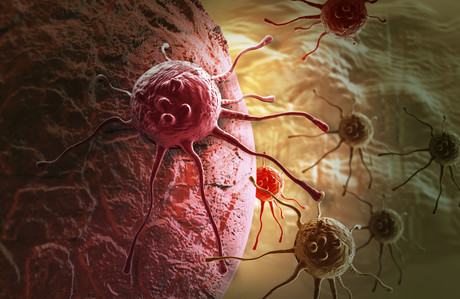Tumour blood supply stopped in its tracks by dextran-catechin

An international study, led by researchers from the Children’s Cancer Institute and University of New South Wales, has uncovered a new way of dealing with neuroblastoma, a form of cancer that typically affects infants as young as one or two years of age.
Head researcher Dr Orazio Vittorio had previously discovered that the natural polyphenol catechin is effective at slowing tumour growth in the laboratory but was too unstable for clinical usage: “We joined catechin with a sugar called dextran. We found this dextran-catechin complex is much more stable in the body and that it slows tumour growth by affecting copper levels — but we didn’t know precisely how.”
Endothelial cells require copper and this new research found that the presence of dextran-catechin disrupted the formation of these cells that line blood vessels. Clearly visible though a microscope, the normal branching networks of blood vessels failed to form properly when human endothelial cells were cultured and treated with dextran-catechin.
According to Dr Vittorio, “Instead of forming a neat, branching network of blood vessels, you see a mess of cells all over the place, which means cancer cells can’t get the blood supply they need.”
During angiogenesis, endothelial cells require copper to switch on the genes that control the growth and formation of blood vessels. The presence of dextran-catechin interferes with copper uptake:
“Dextran-catechin inhibits specific copper transport proteins in the cells that line the blood vessels, altering intracellular copper levels. This prevents the cells joining together to form the network of vessels that supplies tumours with blood to keep growing.”
While further laboratory research is required before dextran-catechin can proceed to clinical trials, its potential appears promising: “This is exciting because it’s a new target for the childhood cancer neuroblastoma that appears safe and has minimal side effects.”
Published in Scientific Reports, this research was spearheaded by the Children’s Cancer Institute and UNSW Science, with assistance from the Australian Centre for NanoMedicine and the ARC Centre of Excellence in Bio-Nano Science and Technology.
Established in 1976, the Children’s Cancer Institute has been at the forefront of research into the causes, prevention and cure of childhood cancer for over 40 years. The institute is currently leading the establishment of the Zero Childhood Cancer national child cancer personalised medicine program in partnership with the Sydney Children’s Hospitals Network.
Breakthrough drug prevents long COVID symptoms in mice
Mice treated with the antiviral compound were protected from long-term brain and lung dysfunction...
Antibiotics hinder vaccine response in infants
Infants who received antibiotics in the first few weeks of life had significantly lower levels of...
Colossal announces 'de-extinction' of the dire wolf
Colossal Biosciences has announced what it describes as the rebirth of the dire wolf, which would...




